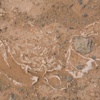Disclaimer
This entry contains information known to us from a variety of sources but may not include all the information currently available. Please be in touch if you notice any inadvertent mistakes in our presentation or have additional knowledge or sources to share. Thank you.
Archive
Cemetery at Joarf, Morocco
This cemetery outside the small town of Joarf does not have any markings to distinguish it as Jewish, and not much more to confirm it is a cemetery; there is only a scattering of rocks. As is common throughout southern Morocco, however, amidst the rocks are women’s undergarments and broken pottery—the tell-tale signs of Amazigh (Berber) women’s ritual ablutions that only occur at Jewish burial sites. This tradition is all that testifies to the Jews buried in this desolate landscape. No sources found for original summary. (8/2014)
Description
Morocco By the late 1200s, the Jews of Morocco gained the ruling Berber dynasty's permission to openly practice Judaism. Morocco became a haven for Jews fleeing persecution in Spain; as many as twenty thousand Jews arrived in Morocco in 1492 after being expelled from Spain.1 By the seventeenth century, Jews lived in more than 250 communities in Morocco; Jewish traders were everywhere in the countryside, providing a connection between the costal cities and the smaller communities of the Sahara.2 During Spain's occupation of Tetouan in the early 1860s, many Jews fled from port cities to the countryside or even to Algeria. When the Crémiuex Decree of 1870 granted French citizenship to Algerian Jews, many Moroccan Jews settled in Algeria. At the beginning of the twentieth century, Morocco had the largest Jewish population of any Arab country, numbering between 110,000 and 120,000 people (about 2.5 percent of the population) in 1912.3 The population reached a peak of around 250,000 in the 1950s. Morocco gained independence in 1956, and a series of governmental decisions (including partially nationalizing the Alliance Israélite Universelle schools and temporarily forbidding postal relatiosn with Israel) made many Jews eager to emigrate.4 Once emigration policies were relaxed in 1962, more than 130,000 Jews left Morocco over the next thirty years, usually settling in Canada, France, or other Western European countries. Today, Morocco's Jewish population is less than five thousand people, most of whom live in Casablanca.5
Sources
[1] Hatimi, Mohammed. Encyclopedia of Jews in the Islamic World. "Morocco." Brill Online, 2014. Accessed July 17, 2014. http://0-referenceworks.brillonline.com.luna.wellesley.edu/entries/encyclopedia-of-jews-in-the-islamic-world/morocco-COM_0015720
[2] Ibid.
[3] Ibid.
[4] Ibid.
[5] Ibid.




